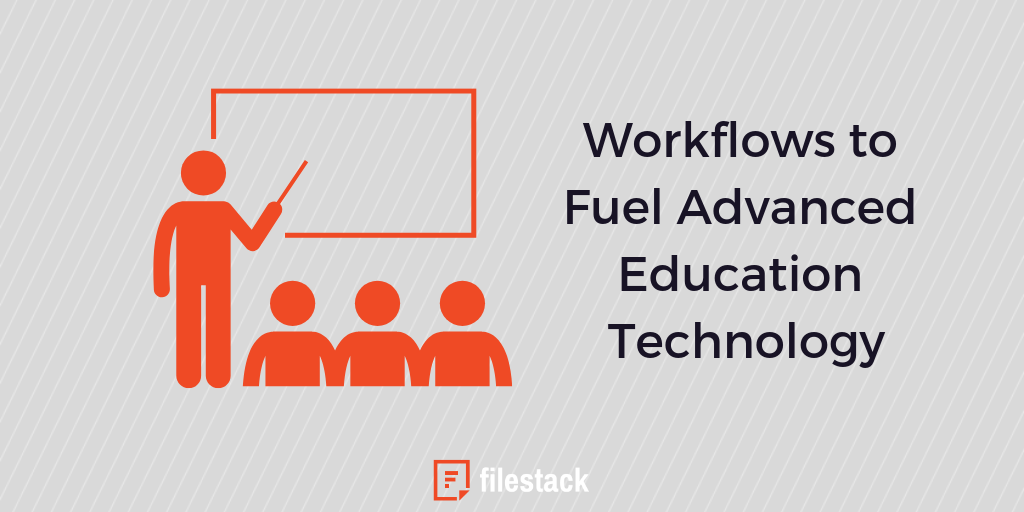This use case study will help you understand how digital content workflows, chain actions and content pipelines improve the flow of information between or within organizations. It will then explain how to tailor specific API calls to deliver streamlined solutions to benefit the education technology (EdTech) industry.
To start, let’s take a look at a more generalized idea of content workflows and then apply that understanding to the needs of the EdTech industry. A workflow can generally be defined as: a progression of sequential steps or actions that comprise an overall work process that adds value to an individual or organization’s activities. Digital content curation and content workflows rely on electronically created information. The Filestack content workflow develops chain actions and content pipelines all within a single API.
Key Takeaways
- Content workflows automate the sequential steps required to process digital information in EdTech.
- A single API can manage a complex content pipeline, including virus scans, NSFW checks, and plagiarism detection.
- Automated workflows can quarantine suspicious files and notify both students and teachers of the issue.
- These systems simplify the entire process of acquiring, preparing, and distributing educational content.
- Workflows are customizable, allowing institutions to tailor file transformations and processes to their specific needs.
Content Workflows in Education
Today, it is inevitable that education and technology go hand-in-hand. In the world of education technology, content workflows are successfully used in administration, curriculum development, student-teacher interaction and research.
Filestack has developed several workflow solutions targeting the various aspects of the education technology industry as described above. For advanced EdTech, the solution is the Filestack Workflows API that allows teachers and students to safely pass assignments and other materials back and forth every day. They no longer have to worry that a virus will be shared through their interactions and the API calls can be easily imbedded in other programs.
Workflows for Student-Teacher Interaction
The workflow process scans every assignment and document for a virus and quarantines anything suspicious for later review. As a file is quarantined it will also alert both the instructor and the student so the assignment is considered under review rather than late.
Filestack Workflows curates the chain actions, the content pipeline and all the interactions between teachers and students. Educators no longer have to worry about malicious files passing through to other users once digital content curation and digital content workflow is in place.
Once the student uploads a homework assignment (Word doc, PDF, etc.) the teacher-student workflow steps would look like the following:
Step 1: Virus Scan
Step 2: NSFW content check with object detection
Step 3: Plagiarism check
Step 4: Storage categorization based on time submitted
Step 5: Release file from quarantine status
Step 6: Deliver document to intended destination
Step 7: Notify all interested parties that the document has been delivered
Filestack Workflows for Every Environment
Whatever your role in EdTech, there is a way to easily implement content workflows into your daily processes using pipelines that deliver prepackaged digital solutions. Why DIY when you can API?
Filestack workflow solutions allow you to consolidate your entire content pipeline into a single API. You can acquire user content from multiple sources, prepare and curate it as necessary, place it wherever it needs to go and then have an API call issued to bring it into whatever step in the process it is needed.
The end result is a cleaner, easier to manage process for acquiring, preparing and distributing your content. With content workflows, you can easily automate and customize all the necessary steps for your content in a single API call. Digital content workflows orchestrate and complete every task it takes to get your files in the desired format and destination.
Filestack Workflows is a powerful yet efficient tool. There is a full list of file transformations and machine learning models available that allow you to design your workflow to fit your specific need.
Reach out to us today for a more detailed discussion on content workflow processes and how you can develop customized workflows from the Filestack arsenal to better your institution.
Filestack is a dynamic team dedicated to revolutionizing file uploads and management for web and mobile applications. Our user-friendly API seamlessly integrates with major cloud services, offering developers a reliable and efficient file handling experience.
